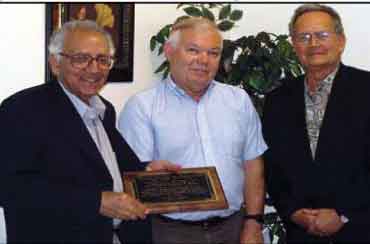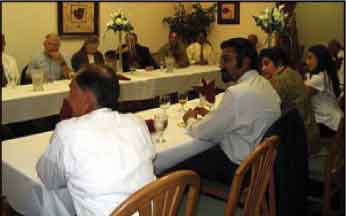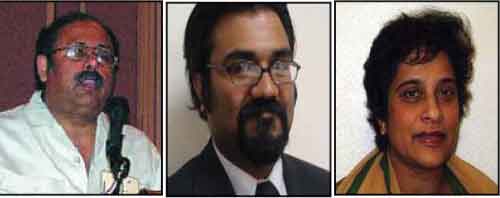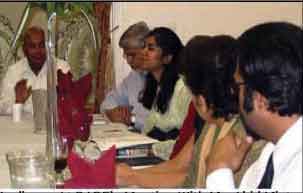Minto’s Brilliant
Analysis of “Military-Feudal Complex”
By Dr Lisette Poole and Hazem Kira
 L to R : Abid Hassan Minto, Laurence
Michalak and Peter Camejo
L to R : Abid Hassan Minto, Laurence
Michalak and Peter Camejo |
Freemont, CA: Abid Hassan
Minto, an eminent jurist, constitutional expert, professor,
author, literary critic, public intellectual and political
leader, enthralled his Bay Area audience with a brilliant
analysis of Pakistan’s “military-feudal complex”
and its devastating impact on common folks, particularly
landless peasants and farm workers.
He spoke at a “Roundtable on Poverty, Illiteracy and
Dictatorship” organized by the Pakistan American Democratic
Forum (PADF), an organization created in 1982 to help achieve
constitutional and functional democracy in Pakistan.
The PADF Roundtable comprised of activists, writers, columnists,
analysts, scientists, and academicians including, Dr. Haseeb
Rizvi, Dr. Ahmed Faruqui, Dr. Waheed Siddiqui, Prof. Laurence
Michalak, Mr. Ashraf Chaudhry, Mr. Rafaat Mahmud, Mr. Ras
Siddiqui, Ms. Reshma Yunus, Ms. Tajwer Kadri, Ms. Ayesha
Mohsin, Mr. Khurshid Khoja, Mr. Sagir Ahmed, Mr. Sean Saigal,
and Dr. Agha Saeed.
Introducing Mr. Abid Minto, Dr. Agha Saeed said: “Noted
African-American scholar W. E. B. Dubois had advised ‘the
talented tenth’, the best and brightest in the African-American
community, to accomplish three goals: 1) become ‘teachers
of teachers’ and help educate the community, 2) involve
themselves with basic philosophical, moral and intellectual
issues of their age and not limit themselves to vocational
training only; and 3) use public education to elucidate
matters of civil and human rights as well.
 A section of the audience
A section of the audience |
“Well, that’s
exactly what Mr. C. R. Aslam and Mr. Abid Hassan Minto have
done in Pakistan over the span of last fifty years. They
have educated several generations of Pakistani intellectuals
and activists in critical political thinking and organized
civic action. Their greatest collective contribution has
been articulation of new forms of political awareness and
social consciousness. They have been pioneers in creating
public awareness of the need for rational reorganization
of the Pakistani society, especially its socio-economic
system.
“Domestically, Mr. Minto has consistently opposed
militarism, feudalism, corruption, and oppressive social
practices; internationally, he has always opposed colonialism,
neocolonialism, and imperialism.
“While he is opposed to obscurantism and religious
fanaticism of all brands and variations in the Muslim world
and beyond, he is also vigorously opposed to occupation
of Iraq and Afghanistan by the United States and occupation
of Palestine by Israel.
 Agha
Saeed, Khurshid Khoja, Reshma
Yunus
Agha
Saeed, Khurshid Khoja, Reshma
Yunus |
“Since that end of the
World War II, there have been two movements for democracy:
one for democracy inside each nation, and second for democracy
among nations. Mr. Minto supports both these movements.
He stands for both vertical and horizontal democratization.
For half a century, he has advocated rule of law over individuals
and groups and rule of international law over nation states.”
Focusing his speech on the root causes of “poverty,
illiteracy and dictatorship” Mr. Minto said that these
problems result from a decadent, dysfunctional and exploitative
system that can be termed as the “military-feudal
complex”, which has resulted from a number of historical
factors:
1. At the time of partition, people of
Pakistan were disenfranchised and marginalized by transfer
of power to elites who were not elected by the people of
Pakistan.
2. Quaid’s
ideas enshrined in his August 11, 1947 speech before the
Constituent Assembly that Pakistan will not become a “theocracy”
and all its citizens, whether Muslim, Hindu, Sikh or Christian,
will have equal rights in Pakistan, was first resisted and
later ignored by his close associates.
3. From day
one the West Pakistani elites composing of feudal lords
came to dominate the political system. Their exploitative
policies led to the breakup of Pakistan.
4. Continued
conflict with India over Kashmir and ensuing wars resulted
in a coalition between the feudals and the army. These wars
also led to creation of a mindset that favors maintenance
of large and expansive army and its continued domination
of the civil society.
5. This large
army has been expanding its institutional power at every
turn of events. We can see a radical difference between
Gen. Ayub Khan’s coup in 1958 and Gen. Musharraf’s
coup in 1999. While Ayub Khan sought to “civilianize”
his military rule, Zia and Musharraf successfully militarized
the civilian structures. The armed forces are no longer
an institution relatable to the defense of Pakistan only.
Now the army is directly involved with the economic governance
and commercial processes of the country.
6. The Pakistan
Army, involving both active duty and retired officers, has
emerged as the largest consortium of corporations, banks,
farms, transportation companies, and other revenue-generating
units. But these military control commercial enterprises
are not subject to normal rules and regulations.
7. High-ranking
members of Pakistan army have been entering the circle of
feudals by acquiring land through army. Today, who are the
peasants and farm workers in Okara and Khanewal struggling
against? Not individual landlords, but the Pakistan army
that has institutionalized itself feudalism.
8. The right-wing
parties have been only too eager to bless these nefarious
relations between the army and the feudals.
9. Cooperation
between the US and the Pakistan army during the Soviet invasion
of Afghanistan brought about the radicalization and militarization
of religious institutions, and, in turn afflicted Pakistan
with gun and drug culture.
10. Both
Zia and Musharraf have succeeded in achieving a constitutional
quietism in the country. Courts have been silenced through
various stratagems, including the oath of office under the
Provisional Constitution Order of 1999, which stipulated
that “the Supreme Court or High Courts and any other
court shall not have the powers to make order against the
Chief Executive or any person exercising powers or jurisdiction
under his authority”. [Mr. Minto’s sharp criticism
of this issue was published in Pakistani newspaper Dawn
on 28th of January 2000 under the title “Minto terms
new oath an ‘act of highhandedness’.”]
11. Recent
improvement in macroeconomic categories have not helped
average person; if anything it has hurt the working and
lower middle classes due to increased inflation.
12. Oppression
of women, minorities and working classes is rooted in the
class structure of Pakistan and cannot be ended without
ending militarism and feudalism. Pakistani feudals are the
main reason that 54 percent of Pakistanis, roughly 80 million
people have been or will be denied access to basic education.
Going from diagnosis, what
is wrong and why, to prognosis, what should be done to rectify
this situation, Mr. Minto who had teamed up with South African
President Nelson Mandela, when they were respectively elected
vice president and president of the International Lawyers’
Association (1990-1995) said people everywhere must rise
against corporate globalization that fosters more wealth
for the already rich and leaves developing countries in
sheer poverty.
 A section of the audience at
the PADF meeting
A section of the audience at
the PADF meeting |
“Recent Anglo-
American efforts to use the rest of the world as a colony
are being met by a resistance. While some people can accept
globalization they do not want corporate takeover,”
he said.
Commenting on Mr. Minto’s speech in the context of
his political career, Prof. Laurence Michalak, former vice
chairman of Center for Middle Eastern Studies at UC Berkeley,
said: “Mr. Abid Hassan Minto is a man of law, justice,
conscience, and peace, with the courage of his convictions.
“I find great similarities between his political career
and that of Abdul Ghaffar Khan.
“Abdul Ghaffar Khan, also known as Badshah Khan, was
the leader of a nonviolent Muslim movement for the independence
of India, which at that time of course meant the whole Indian
subcontinent, before partition. Today the popular press
tends to associate Islam with violence—which is not
correct, because Islam is a religion of peace. In his nonviolence,
Badshah Khan was a true Muslim.
“Badshah Khan spent many years in prison for his principles.
His 33 years in prison amount to even more than Nelson Mandela,
who spent 28.5 years in prison. I would only like to say
that Mr. Abid Hassan Minto is like Badshah Khan in several
respects. Both have been committed to the rule of law and
to justice achieved through peaceful means, and both were
committed enough in their beliefs that they were willing
to go to prison. Mr. Minto was imprisoned under General
Zia. Like Badshah Khan and Nelson Mandela, Mr. Minto was
adopted as a prisoner of conscience by Amnesty International.”
“Mr. Minto is an intellectual giant – a gentle
giant,” another participant commented. Jo Cazenave,
who works as the district director in Congressman Pete Stark’s
Freemont office, effectively summed up the feelings of many
in the audience. “This speech,” she said, “should
have been heard by thousands of Americans”.
(Lisette B. Poole and Hazem Kira are freelance journalists
based in the San Francisco Bay Area; Lisette Poole also
lecturers at CSUH)
-------------------------------------------------------------------------------------

